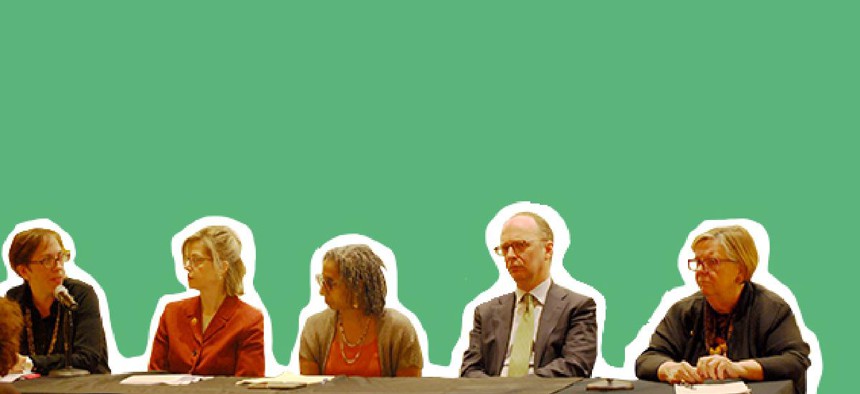Defining success remains elusive for New York City human services nonprofits

Photo by Dave Gentile for NYN Media
Representatives from city government, philanthropy and some of New York’s human service organizations gathered last week to discuss a recent report that suggested ways to strengthen the sector. But there was little agreement about how to implement those suggestions.
The panel, hosted by the Human Services Council and The Center for New York City Affairs at The New School on Friday, March 9, was called together to discuss a January report commissioned by the Alliance for Strong Families and Communities and the American Public Human Services Association entitled A National Imperative: Joining Forces to Strengthen Human Services in America.
The report focused on the impact community based organizations have on our society and economy and identified things these organizations need to better meet their goals. But part of the panel discussion noted challenges that could frustrate progress. For example, the report calls for an effort to “focus on a common set of widely-used outcomes and core measures with accountability and appropriate flexibility” – with funding targeted to outcomes and results. But some panelists saw this goal as stymied by the lack of a universal language for reporting results.
“We talk about everything as high quality, without any sort of sense of what high quality means, and we talk about things as evidenced-based without really saying what is the evidence base that we are looking for,” said Emary Aronson, chief program officer of the Robin Hood Foundation,
“I think there’s a rightful reason to expect results, I just don’t know if we are there yet in terms of how to talk about those results: outcomes, outputs, etc.,” said New York State Interagency Coordinator for Nonprofit Organizations Fran Barrett. “In all due respect to all of us who bang our head against that wall, I think we have some deeper thinking to do on that topic,” Barrett said
Others wondered what was more essential, a commitment to long-term outcomes or assessing short-term results.
“It’s not necessarily either/or, a long-term outcome or nothing,” said Deputy Mayor for Health and Human Services Herminia Palacio.
Dylan Roberts, a partner, with Oliver Wyman and one of the authors of the report said that “there’s a huge opportunity and need for the nonprofit community to look at creating some form of shared services and utilities that can service the sector,” said Roberts. The need to share resources is especially strong for smaller organizations who cannot afford to spend on areas like financial reporting, IT departments and legal departments, he added.
But data-sharing is not without risks said Ariel Zwang, CEO of Safe Horizon. “The other side of the coin of big data and technology is privacy,” said Zwang. “Keep in mind that the more data is aggregated, the less anyone is able to protect it.”
Attendees did agree that no single suggestion could be effectively applied across the board and panelists considered developing better ways to showcase their accomplishments.
“It is a big undertaking to determine what works in human service intervention over time,” Zwang said.
